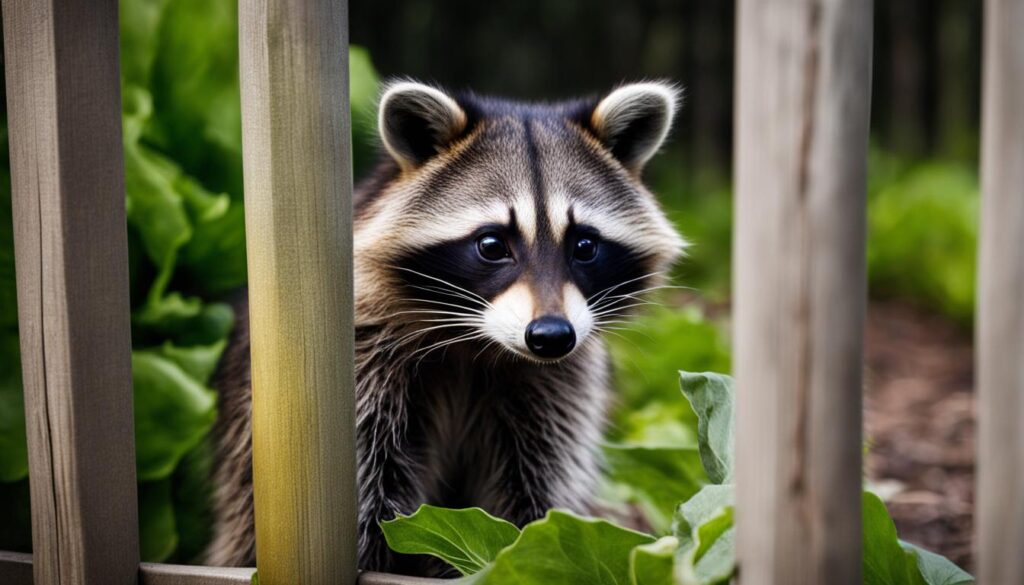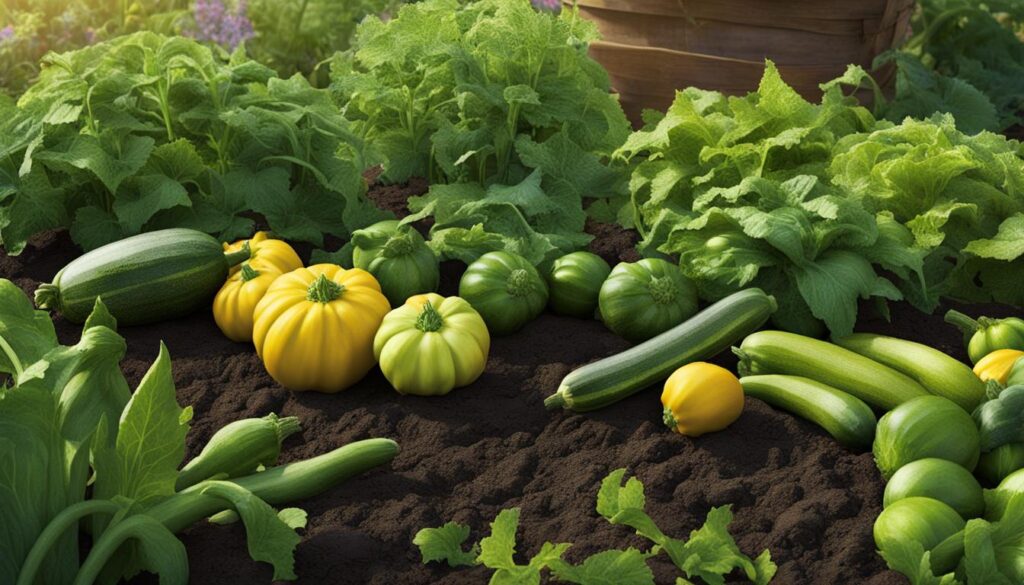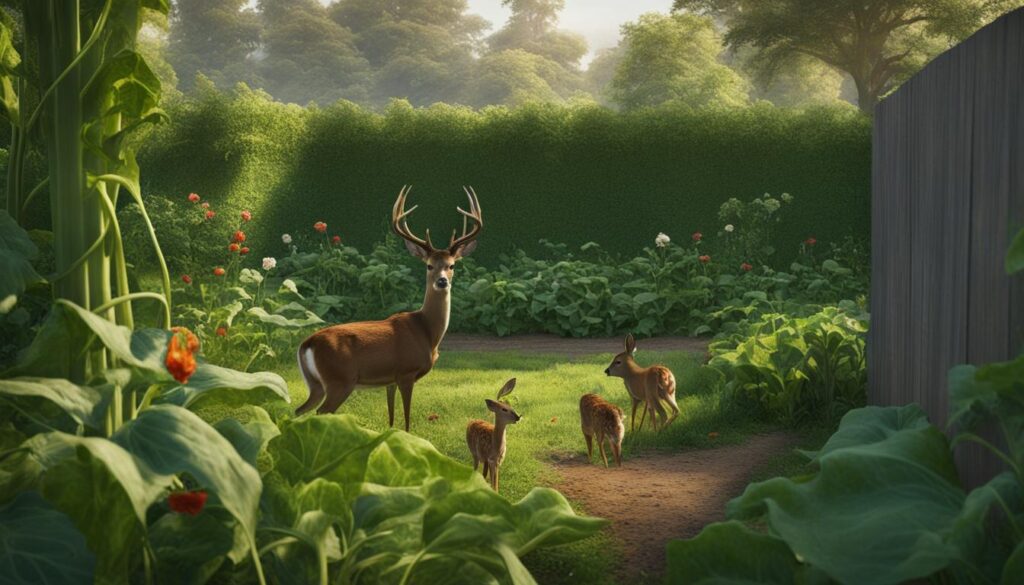Zucchini plants offer a bountiful harvest and are quite popular among gardeners. However, they are susceptible to attacks by various zucchini pests and other garden animals, making it essential for you to protect your plants. To ensure that you are better prepared for dealing with these intruders, being able to identify them is vital. In this guide, we will explore some common garden animals that love to munch on zucchini, discuss their telltale signs, and provide you with effective strategies for protecting zucchini plants from these unwanted visitors.
Key Takeaways
- Various garden animals target zucchini, making it important to identify and protect against these pests.
- Recognizing signs of damage and animal presence is crucial for successful garden pest identification.
- Common zucchini-eating garden animals include rabbits, deer, squirrels, raccoons, groundhogs, and smaller rodents like rats and mice.
- Effective strategies for protecting zucchini plants involve a mixture of physical barriers, repellents, and deterrents.
- Maintaining a clean and tidy garden helps significantly in minimizing garden animal problems.
An Overview of Zucchini-Loving Wildlife
Zucchini plants are a favorite among various wildlife in the garden, resulting in a diverse range of animals that enjoy feasting on them. From mammalian pests to pesky insects, these zucchini-loving critters can cause significant damage to your plants. In this section, we will explore the common zucchini pests and how to identify their presence in your garden.
Let’s start with some of the most recognizable zucchini-loving animals:
- Skunks
- Rats
- Groundhogs (Woodchucks)
- Rabbits
- Raccoons
Skunks are nocturnal animals that leave a distinct odor and five-toed paw prints. They are known to dig into the soil to find insects and can cause damage to zucchini plants in the process. Their characteristic smell gives them away, helping you identify their presence in your garden.
Rats, with their gnawing habits, can invade gardens seeking shelter and food. They breed prolifically if unchecked and can decimate zucchini plants, leaving behind chewed leaves, stems, and fruits.
Groundhogs, also known as woodchucks, are notorious for burrowing and causing damage to zucchini plants. They can eat zucchini even when hard and unripe, leaving behind deep holes, distinct clawed paw prints, and teeth marks.
Rabbits tend to consume zucchini stems and roots when other food sources are scarce. They can leave behind cut-like damage, making them one of the main culprits in zucchini plant destruction.
Raccoons, being omnivores, indulge in zucchini for its nutrients and hydrating nature. They leave behind scratch marks and overturned trash as evidence of their presence in the garden.
In addition to these mammals, your zucchini plants may also face threats from insects such as aphids, cucumber beetles, spider mites, and squash bugs. These pests can steal nutrients from your plants, stunt their growth, and cause noticeable damage to the leaves.
| Animal | Damage | Signs |
|---|---|---|
| Skunks | Soil digging, damage to roots and leaves | Strong odor, five-toed paw prints |
| Rats | Chewed leaves, stems, fruits | Musky odor, droppings |
| Groundhogs | Burrows, damage to unripe zucchini | Deep holes, distinct clawed paw prints, teeth marks |
| Rabbits | Cut-like damage to stems and roots | Angled bite marks, scattered droppings |
| Raccoons | Scratch marks, missing fruits | Five-toed tracks, toppled trash |
Identifying garden pests is essential for successfully protecting your zucchini plants. By familiarizing yourself with the signs and damage left by these animals, you can take targeted, effective measures to deter them and maintain a thriving garden.
Detecting the Culprits: Signs of Zucchini Munchers
Determining which animal is damaging your zucchini plants involves a thorough garden investigation, as you’ll need to observe the tell-tale signs left in your garden. Ranging from tracks and droppings to distinct types of damage, garden pest evidence can be subtle but revealing. In this section, we will provide a guide for detecting garden pests by identifying signs of zucchini damage specific to each culprit.
- Skunks: Known for their notorious smell, skunks are nocturnal diggers whose presence can be identified by five-toed paw prints around damaged zucchini plants.
- Rats: Rats leave behind a musky odor and droppings as they move through your garden, eating from your zucchini plants.
- Groundhogs: Groundhogs or woodchucks are burrowers, with clawed paw prints marking the entrances to their underground homes. Their presence is especially noticeable around any destroyed zucchini plants.
- Rabbits: Feasting on the lower parts of plants, rabbits leave angled bite marks and scattered droppings as evidence of their presence.
- Raccoons: Raccoons have distinctive five-toed tracks, and they often topple trash cans in search of food. You may find them foraging around your zucchini plants at night.
- Insects: Insects like aphids, cucumber beetles, and others cause wilting, stunted growth, and visible plant damage, often overlooked but significant to the well-being of your zucchini plants.
Now let’s examine each pest in more detail and the signs that indicate its presence:
| Pest | Signs of Damage | Other Identifying Features |
|---|---|---|
| Skunks | Five-toed paw prints, uprooted plants, dug up soil | Strong, foul odor |
| Rats | Gnawed stems, fruits, and leaves | Musky odor, droppings |
| Groundhogs | Burrows near plants, clawed paw prints, teeth marks on stems and leaves | Visible burrow entrances |
| Rabbits | Angled bite marks on stems, eaten foliage and blossoms | Scattered droppings, tracks |
| Raccoons | Scratch marks, toppled trash cans, nibbled leaves | Five-toed tracks, foraging at night |
| Insects | Wilting, stunted growth, visible plant damage | Presence of insects on plants, damage to plant tissue |
By recognizing and acting on the signs of zucchini damage, you’ll be well-equipped to protect your precious plants from these unwanted visitors.
Common Herbivorous Pests: From Deer to Rabbits
While a variety of animals may be responsible for damage to zucchini plants, deer and rabbits stand out as some of the most common culprits for garden herbivores. Implementing effective deer and rabbit pest control measures can help maintain healthy, flourishing zucchini crops. Let’s explore the impact of these two garden perpetrators on zucchini plants and how to combat their invasions.
Unwelcome Deer in the Zucchini Patch
Deer can wreak significant havoc on zucchini plants overnight, consuming both leaves and fruits, often leaving a path of destruction characterized by broken plant parts and branches. To distinguish deer as the perpetrators, gardeners should look for sizable hoof prints and droppings in the area.
Defenses against deer damage include creating deer-proof gardens using:
- Commercial repellent sprays or granules
- Homemade deterrents like hanging highly scented Irish Spring Soap
- Physical barriers such as tall fencing
Rabbits: The Leafy Green Lovers
Rabbits have an appetite for leafy greens and will readily consume zucchini plants, including the blossoms and fruits. Visible markers of rabbit activity can include sharply incised bites and gnawed away lower parts of the plant. Rabbit droppings scattered around zucchini plants further confirm their presence.
Preventive measures against rabbit damage involve creating rabbit-proof gardens by:
- Installing physical barriers, such as fences that reach underground to prevent burrowing
- Applying scent deterrents like chili or hot pepper flakes to keep them at bay
- Protecting zucchini from rabbits using plant cages
Remember, even if you focus on deer and rabbit deterrents, it is important to be aware of other possible pests and have a holistic approach to pest control. By using multiple strategies, you can maintain a thriving zucchini garden with minimal damage from various wildlife invaders.
Protecting Your Zucchini from Small Rodents
Small rodents like squirrels, chipmunks, rats, and mice are adept at navigating garden barriers and can cause substantial damage to zucchini plants. Evidence of their activity includes chewed leaves, fruits with bite marks, and uprooted plants.
To protect zucchini plants from these agile pests and ensure zucchini plant protection, several small rodent deterrents can be employed. These methods focus on small rodent control and fortifying your rodent-proof garden.
- Repellent scents: Apply botanical-based repellents such as cayenne pepper, garlic, or chili powder around your zucchini plants. These scents are known to deter rodents and keep them away from your garden.
- Physical barriers: Install fences or mesh cages around your garden beds. Make sure the mesh openings are small enough to prevent rodents from entering.
- Companion planting: Plant herbs and flowers that rodents find distasteful, such as lavender, mint, or marigolds around the borders of your garden. These plants can help deter small rodents from entering your garden in the first place.
- Strategically placed deterrents: Place fake owl statues or other predators around your garden to scare rodents away. Change the position of these statues regularly to maintain their effectiveness.
While there is no foolproof solution for keeping small rodents away from your zucchini plants completely, a combination of the methods above can significantly decrease their presence in your garden. The key is to make the area as unappealing to rodents as possible, making it more challenging for them to access and consume your beloved zucchinis.
| Deterrent | Method of Application |
|---|---|
| Repellent scents | Organic powders or sprays applied around zucchini plants |
| Physical barriers | Fences or mesh cages installed around garden beds |
| Companion planting | Herbs and flowers with natural rodent repellent properties planted alongside zucchini |
| Strategically placed deterrents | Owl statues or predator decoys positioned around the garden |
By employing these strategies, you can successfully reduce rodent damage to your zucchini plants and enjoy a thriving, rodent-proof garden.
The Nocturnal Bandits: Raccoons and Skunks
Nocturnal garden pests like raccoons and skunks can wreak havoc on your zucchini plants. These clever creatures are known for their love of garden produce and their ability to easily bypass common defenses. To minimize the risk of raccoon damage to your zucchini plants, it is essential to utilize effective raccoon deterrence methods.
Raccoon Raids and Zucchini Disappearances
Raccoons are dexterous nocturnal pests notorious for their ‘grab and run’ tactics when it comes to garden produce like zucchini fruits. Their agility allows them to easily bypass fences and other barriers. To discourage raccoons from feasting on your precious zucchini plants, consider employing some of the following methods:
- Repellents: Use blood meal or other commercial raccoon repellents to keep raccoons at bay. Many gardeners have found these products effective in protecting their garden from raccoons.
- Strategic Planting: Raccoons tend to dislike cucumbers due to their prickly hairs. Plant cucumbers around your zucchinis as a natural deterrent.
- Secure Garbage: Raccoons are attracted to garbage, so securing your trash with tightly fitted lids can help reduce their presence in your garden.
Detecting raccoon activity is essential for preventing raccoon damage to your zucchini plants. Here are a few signs of their presence:
- Missing fruits
- Nibbled leaves
- Distinctive five-toed paw prints
By taking the necessary precautions and employing raccoon-proof garden tactics, you can significantly reduce the likelihood of raccoon damage and ensure a bountiful zucchini harvest.
Do Zucchini-Eating Animals Positively Impact the Growth of Zucchini Plants?
Zucchini-eating animals can have a positive impact on the growth of zucchini plants. Their droppings can serve as a natural fertilizer, enriching the soil and promoting plant growth. For more information on how to optimize the growth of zucchini plants, check out the comprehensive guide.
Conclusion
Successfully safeguarding your zucchini plants from a variety of pests requires a multifaceted approach. Recognizing the specific signs of damage, such as chewed parts, droppings, and tracks, enables you to identify and implement targeted garden protection strategies. By employing both preventive measures and deterrents, you can enjoy successful zucchini cultivation and a more wildlife-friendly garden.
Maintaining a tidy garden is vital for avoiding pest infestations. Eliminate hiding spots and inspect your plants regularly for early signs of invasion. Strategic planting and repellent application are integral components of sustainable pest control and wildlife garden management. Utilizing physical barriers, such as fences and netting, can help to keep destructive animals at bay.
In summary, vigilance in monitoring your zucchini plants and employing appropriate strategies are essential to mitigating the risk of extensive crop damage. By understanding the specific pests that target your plants and employing a combination of deterrents and proactive measures, you can support a thriving and environmentally responsible garden.










